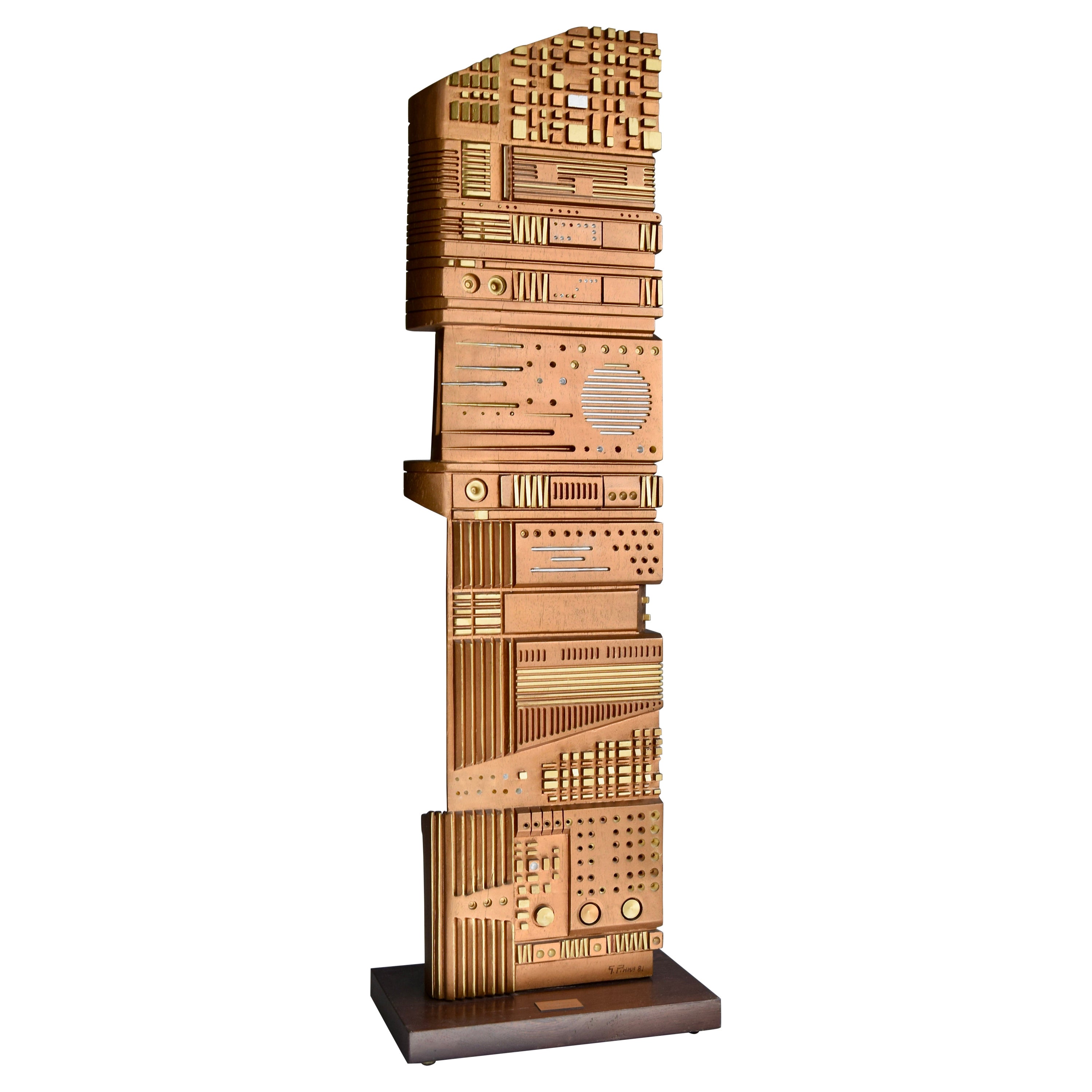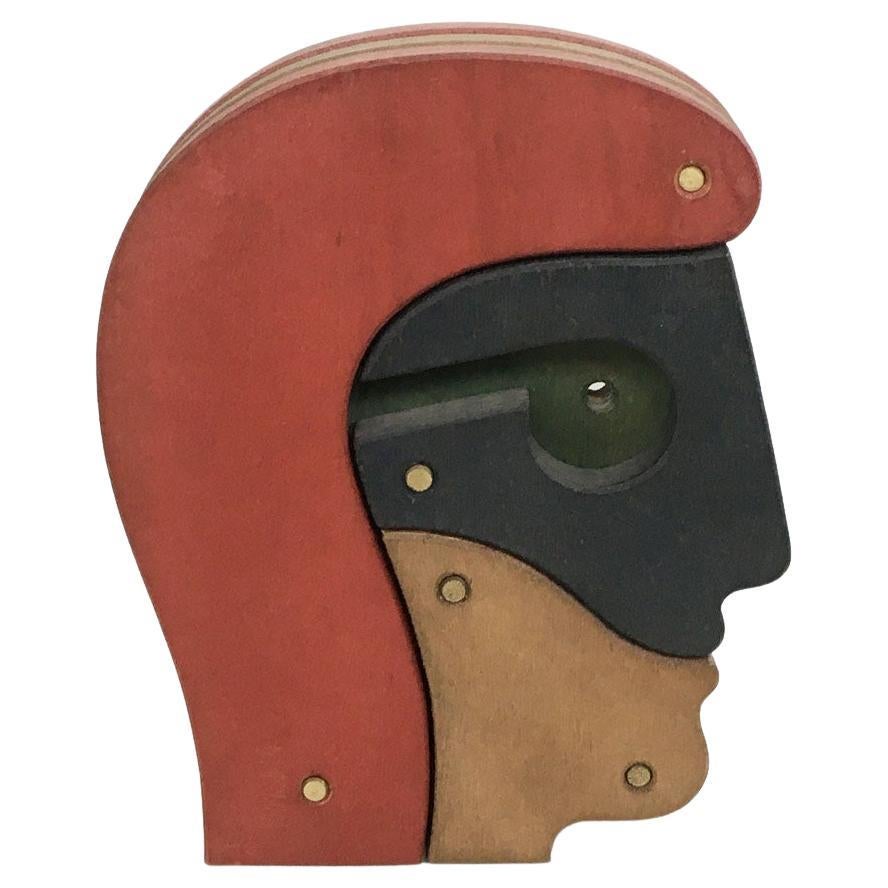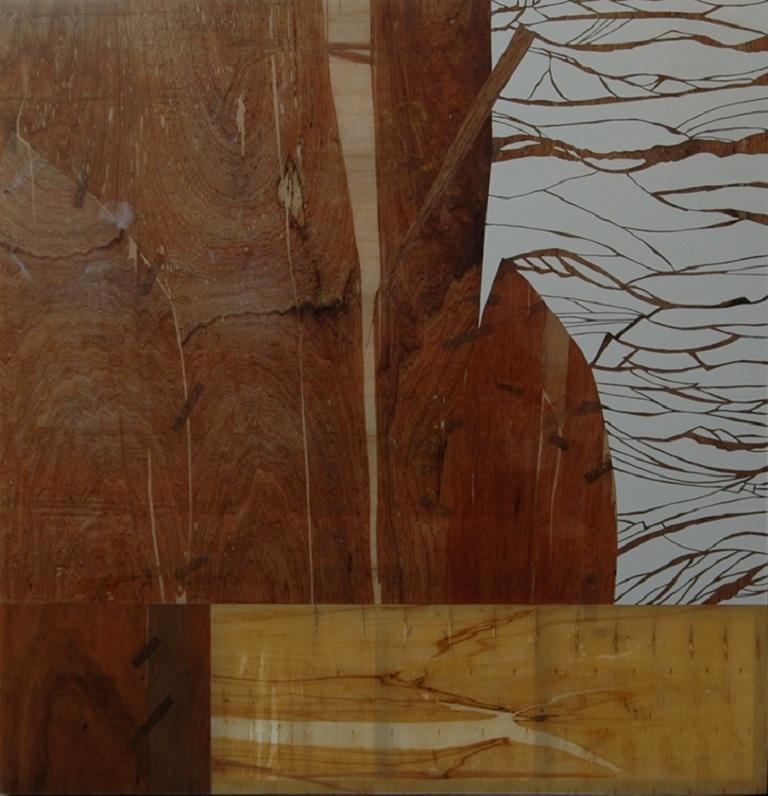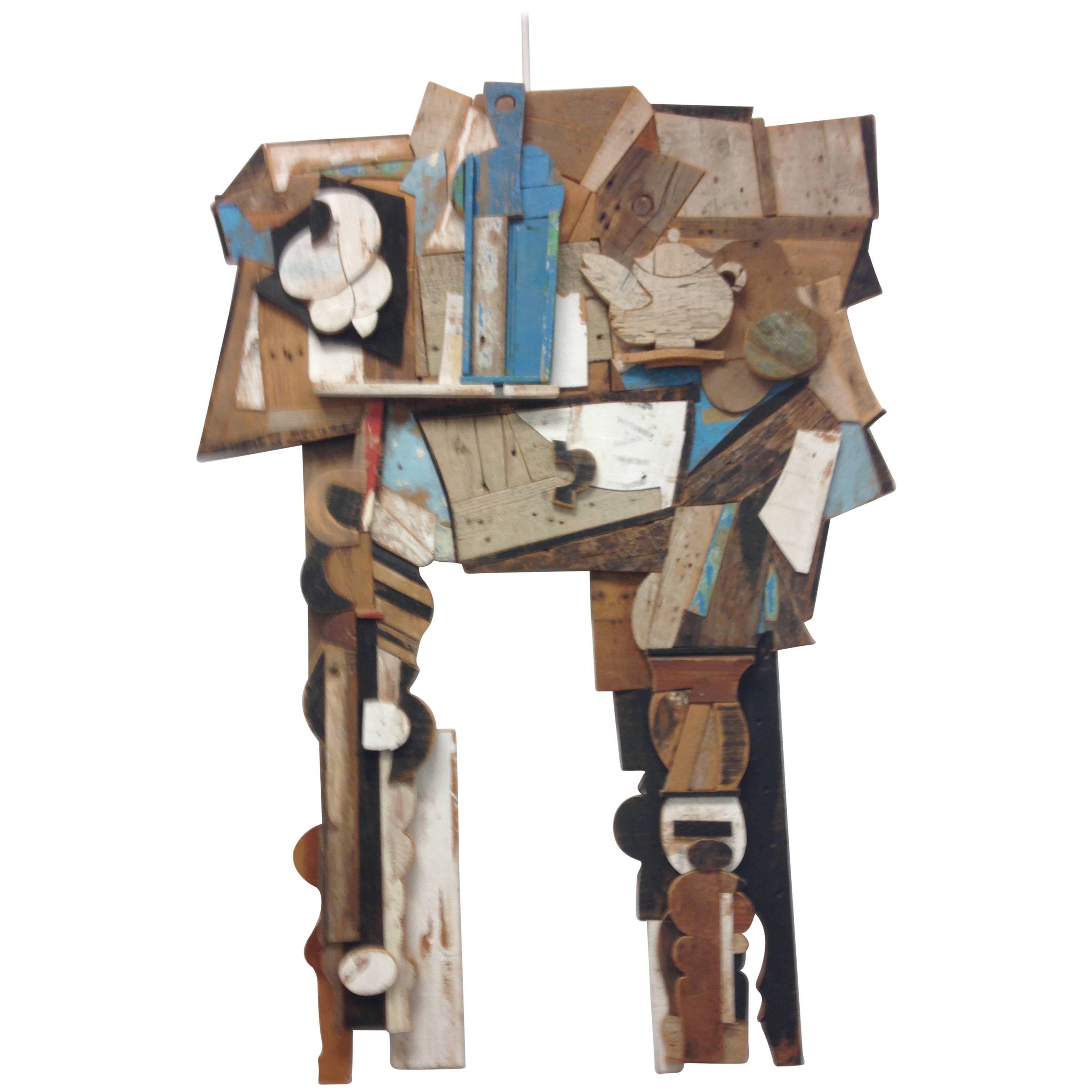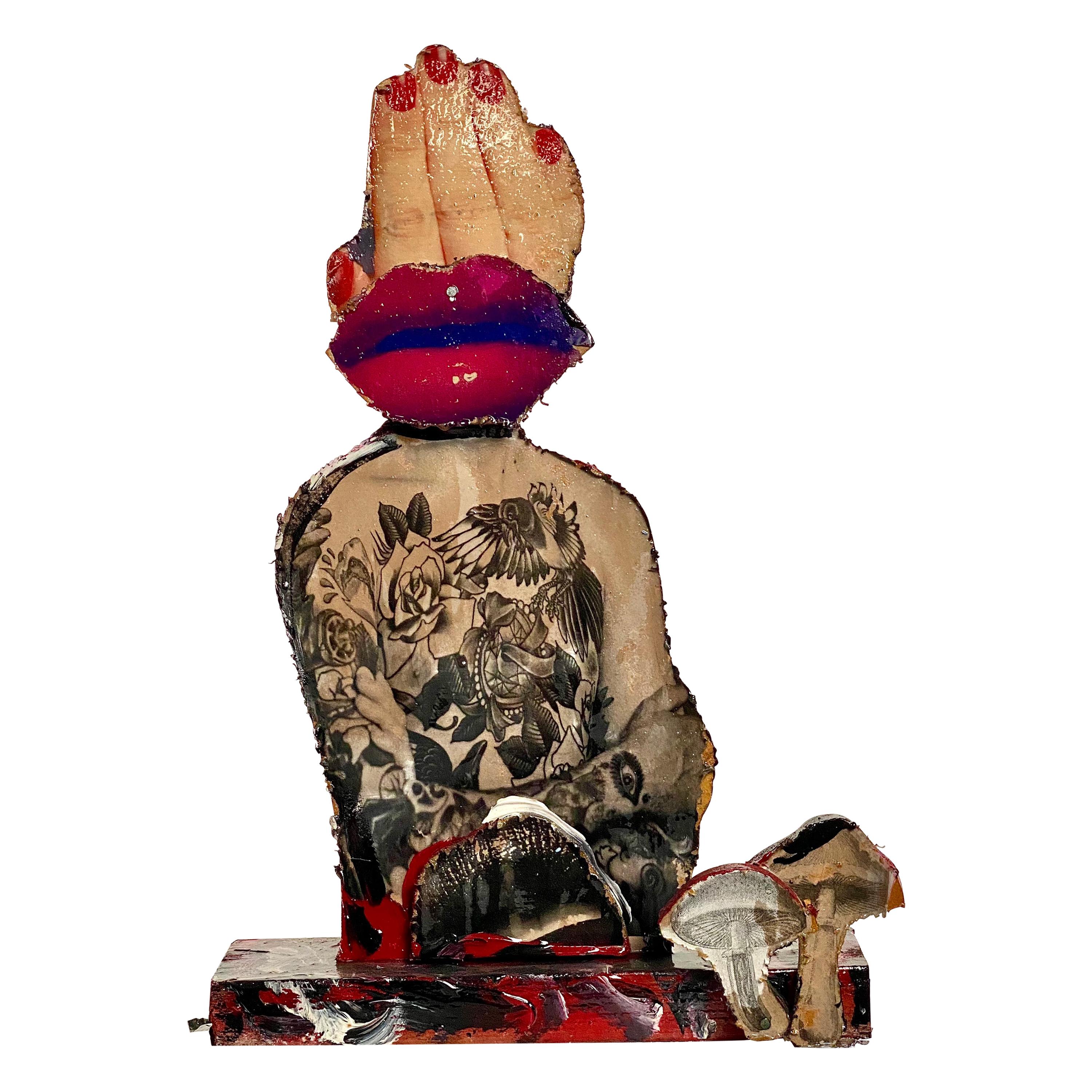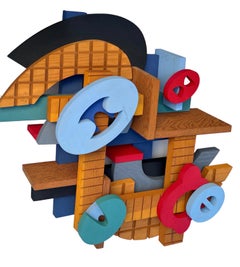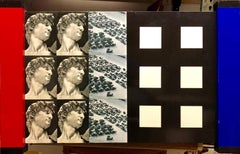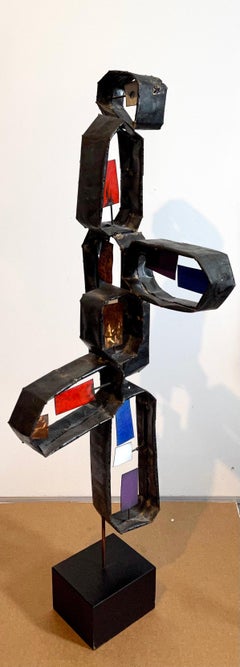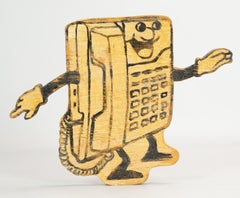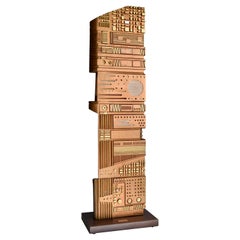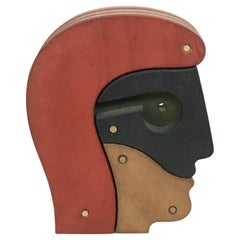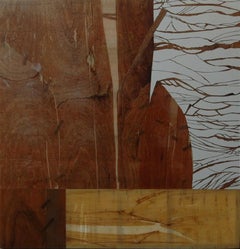Items Similar to 1970's Large Italian Pop Art Mario Ceroli Arte Povera Sculpture Collage in Wood
Want more images or videos?
Request additional images or videos from the seller
1 of 17
Mario Ceroli1970's Large Italian Pop Art Mario Ceroli Arte Povera Sculpture Collage in Wood1970
1970
$2,500
£1,911.38
€2,201.53
CA$3,503.27
A$3,911.07
CHF 2,049.34
MX$47,875.31
NOK 26,026.65
SEK 24,539.82
DKK 16,430.22
About the Item
Mario Ceroli (Italian, 1938-)
Untitled
c. 1970
Wood collage on paper
Cut wood attached to paper, depicting multiple figures facing each other.
Hand signed and numbered to lower right 'Ceroli prova d'artista'. This work is an artist's proof. (not sure of edition)
Dimensions: Framed 35.5 x 47.5. sheet 27.25 x 39.5
Provenance: Basel Art Fair, 1976 CDS Gallery, New York (bears label verso)
Exhibited: Emilio Cerolli, 1976, Sala Funacion Mendoza, Caracas, Venezuela, An International Scene, 20 September - 20 December 2003, CDS Gallery, New York
Mario Ceroli, born 1938 in Castel Frentano, Province of Chieti, Italy
Mario Ceroli is an Italian sculptor. His work has been exhibited at the Museum of Modern Art in New York City and the Mississippi Museum of Art in Jackson, Mississippi. Ceroli is one of the most influential artists of the Italian post-war period. Ceroli moved to Rome at the age of ten where he later graduated from 'Accademia delle Belle Arti'. At the Art Institute he worked under the guidance of Leoncillo Leonardi, Pericle Fazzini and Ettore Colla, where he experimented with the use of ceramic. In 1958, he first exhibited these works at the Premium Spoleto. In the same year Ceroli held his first solo exhibition at Galleria San Sebastianello of Rome. During 1959 he began to experiment with new materials, particularly with raw wood, such as Russian pinewood. He used these materials to create silhouetted shapes in his furniture and objects that related simplistically to the surrounding space. In the 1960's Ceroli took part in exhibitions related to the "Arte de Povera" group. He had also been involved as screenplay director collaborating with "II Teatro Stabile" in Turin and with "La Scala" In Milan. He was part of the generation of Italian post war artists that included Aligliero Boetti, Lucio Fontana, Alberto Burri, Pino Pascali, Piero Manzoni, Enrico Castellani, Arnaldo Pomodoro, Michelangelo Pistoletto, Mimmo Rotella, Emilio Vedova. One of Ceroli's major works was his 'Mobili nella Valle' series, inspired directly by the Giorgio De Chirico 1927 painting of the same name. One of his sculptures is on the Luigi Einaudi campus of the University of Turin, and another one is at the Vatican Museums. In the early 1970s, he had a relationship with the Italian television and film actress Daria Nicolodi. Art Institute. Ceroli's work is sculpture, painting, drawing, creation of objects, environments and scenography. Ceroli is a multifaceted, versatile artist.
His sculpture is construction rather than moulding, the forms are tangible concepts and never abstractions, they are almost always simple, objective, concrete ideas. In the use of bronze, the resulting idea is of a series of stratifications, of consequential planes, which do not give the work that character of plastic uniformity, even within the context of a harmonious and syntonic work. Not just a sculptor of materials, Ceroli seems more interested in creating spaces, environments, majestic scenography: in 1965 he began working on Cassa Sistina , a space that contains all objects: everything is transportable, marketable. Irony and mystification of reality make it an exceptional work of art. Cassa Sistina earned him the Gollin Prize. 1966 was a decisive year: Ceroli exhibited at the La Tartaruga Gallery in Rome, among his various works, The Last Supper created a year earlier, and today preserved at the National Gallery of Modern and Contemporary Art in Rome. From September 1966 to June 1967 Ceroli moved to the United States and in April held a solo exhibition at the Bonino Gallery in New York, where he exhibited Farfalle . Another great masterpiece of those years is China, from 1966, one of the first works in the history of immersive and all-encompassing art, which gave the viewer the impression of almost being part of it.
Spectacularity, plastic spaces, majestic works: in 1969 Ceroli created Io, piramide di ice: a pyramid of ice bricks at the top of which hangs a steel sphere containing burning coal. The 1980s marked the search for the theme of "everything in the round", of spherical materiality, with works that represent a constant dialogue with the environment: La Porta (1981) , Il Cenacolo (1981) , Uomo Vitruviano (1987) date back to these years ), House of Neptune (1988), Mistral (1992), Applause (1992).
The 2000s saw Ceroli engaged in a continuous mix of natural elements, wood and ash, wood, ash and gold foil.
Works such as The Naked Truth, Guerriero Frentano are from 2007 : human figures carved in wood and sprinkled with ash, symbolizing the human being who merges with nature. 2007 is also the year that sees the creation of the majestic work Paolo e Francesca, with the reappearance of the theme of the staircase: human figures stand out on a staircase, with piles of colorful colors at their feet. In the 1960s, he was already considered one of the great masters of Italian Pop Art and Arte Povera. Ceroli’s production features natural and humble materials, particularly untreated wood, but also fabric, plastic or aluminium. His creations, which are sometimes polychrome and serialized, represent common objects, such as numbers, letters of the alphabet, human figures, and allusions to Leonardo da Vinci and other masters of the Italian Renaissance. In the 1970s and 1980s he experimented with polychrome marble, glass, powder and bronze, revisiting artworks from the Renaissance to the present day. Ceroli’s interest in these various disciplines led him to transcend the boundaries of the mere work of art, and to explore how it interacts with other fields, such as architecture or theatre. Today Mario Ceroli lives in Rome with his family.
- Creator:Mario Ceroli (1938, Italian)
- Creation Year:1970
- Dimensions:Height: 35.5 in (90.17 cm)Width: 47.5 in (120.65 cm)
- Medium:
- Movement & Style:
- Period:
- Condition:Good. sheet with minor toning. minor wear.
- Gallery Location:Surfside, FL
- Reference Number:1stDibs: LU38214596182
Mario Ceroli
Mario Ceroli is an Italian sculptor born in Castel Frentano, Italy in 1938. His work has been exhibited at the Museum of Modern Art in New York City and the Mississippi Museum of Art in Jackson, Mississippi. One of his sculptures is on the Luigi Einaudi campus of the University of Turin and another one is at the Vatican Museums.
About the Seller
4.9
Platinum Seller
Premium sellers with a 4.7+ rating and 24-hour response times
Established in 1995
1stDibs seller since 2014
1,786 sales on 1stDibs
Typical response time: <1 hour
- ShippingRetrieving quote...Shipping from: Surfside, FL
- Return Policy
Authenticity Guarantee
In the unlikely event there’s an issue with an item’s authenticity, contact us within 1 year for a full refund. DetailsMoney-Back Guarantee
If your item is not as described, is damaged in transit, or does not arrive, contact us within 7 days for a full refund. Details24-Hour Cancellation
You have a 24-hour grace period in which to reconsider your purchase, with no questions asked.Vetted Professional Sellers
Our world-class sellers must adhere to strict standards for service and quality, maintaining the integrity of our listings.Price-Match Guarantee
If you find that a seller listed the same item for a lower price elsewhere, we’ll match it.Trusted Global Delivery
Our best-in-class carrier network provides specialized shipping options worldwide, including custom delivery.More From This Seller
View AllLarge Abstract Wood Sculpture Colorful Wooden Painting John Okulick Wall Hanging
By John Okulick
Located in Surfside, FL
John Okulick, large colorful wood wall sculpture construction
"Perfect Harmony"
Hand signed and dated, 1999
Dimensions: H: 52 inches:...
Category
1990s Contemporary Abstract Paintings
Materials
Metal
Mixed Media Painting Sculpture Construction 1980s Brazilian Political Art
By Randolfo Rocha
Located in Surfside, FL
Interesting Latin American art collage/assemblage of images. bears elements of Arte Povera. it is mounted onto a wood construction.
Signed verso and bears label from Stux Gallery.
Well Known Brazilian political artist and collector. Showed at Stux Gallery (they showed Doug Anderson and then Mike and Doug...
Category
1980s Pop Art Abstract Paintings
Materials
Wood, Paper, Mixed Media, Acrylic
Italian Mid Century Mod Large Brutalist Welded Copper Enamel Sculpture Wood Base
Located in Surfside, FL
Welded, brazed, copper (based on the weight, this might be iron or bronze) with colorful inset enamel plaques on a painted wood base. A studio handmade Brutalist sculpture in a mann...
Category
Mid-20th Century Abstract Abstract Sculptures
Materials
Metal, Copper, Enamel
Carved Wood Neo Pop Art Painting Sculpture New Orleans Wall Hanging Skylar Fein
By Skylar Fein
Located in Surfside, FL
Skylar Fein, (American, 1968-), carved wood painted sculpture "Telephone Man", black paint on weathered wood, Cartoon figure drawing of phone man. bears artist signature token verso....
Category
21st Century and Contemporary Pop Art Figurative Paintings
Materials
Wood, Paint, Latex
Cuban Master Florencio Gelabert Sculpture Large Wood Carving Bust Man Portrait
Located in Surfside, FL
Florencio Gelabert Y Perez (Cuban, 1904-1995)
Hand carved, signed; 1979
Materials: Cuban wood (mahogany?)
Dimensions 23 X 4 X 4 inches
Label affixed to underside: National Registry of Cultural Assets of the Republic of Cuba Ministry of Culture.
Provenance: Art Master Collection, Miami, Florida.
Florencio Gelabert, with a style reminiscent of Art Deco and Art Nouveau in a Latin American Expressionist stylization. Carved wood sculpture. Depicts a modernist stylized form of a man in a streamline moderne style.
José Florencio Gelabert Pérez (Caibarien, 1904 - Havana, 1995) Cuban musician, sculptor, draftsman and teacher. He graduated from the San Alejandro National Academy of Fine Arts in 1934. He received numerous awards, mentions and recognitions in Fine Arts Halls and Circles. His works are in the permanent collection of the National Museum of Fine Arts. Florencio Gelabert is a renowned sculptor, who made more than twenty solo exhibitions beginning in 1929, several in the National Museum of Fine Arts, and participated in more than thirty collectives in Cuba, Spain and Brazil, the latter in the Sao Paulo Biennial. he traveled from Caibarién to Santa Clara in 1928 to audition to enter the famous San Alejandro Fine Arts School in Havana. He obtained one of the five vacancies. Already in the Cuban capital, he combined fine arts and music. When he graduated, he became a professor in San Alejandro and the academy’s principal in 1960.
With a calling common to wood sculptors –which began with his primary school carving carpentry classes and the active life of his home town’s shipyards, his chisels and gouges feverishly turned mahogany, “ácana” and ebony into female heads with black African features dating back to 1930.
In 1938 he used his savings to explore Europe: France (Paris, Marseilles), Italy (Naples, Rome, Florence, and Venice), Belgium (Malina). His encounter with the works by Aristide Maillol, Auguste Rodin, Ossip Zadkine, Constantin Brancusi and even with Wifredo Lam, who was also born in another Cuban coastal area, Sagua la Grande, and his encounter with the nude marble David sculpture...
Category
1970s Art Deco Figurative Sculptures
Materials
Wood
Bronze Architectural Abstract Theater Model French Contemporary Sculpture
Located in Surfside, FL
Guillaume Couffignal (French b. 1964)
Theatre, 2014. Bronze.
19 7/8 x 13 1/2 x 7 1/4 inches.
Signed on the base: Couffignal. Beautiful texture and patina.
Guillaume Couffignal is a ...
Category
2010s Outsider Art Abstract Sculptures
Materials
Bronze
You May Also Like
1980 Italy Wood Abstract Kinetic Sculpture
By Bruno Chersicla
Located in Brescia, IT
This sculpture is one of a kind piece, no other one exists, and it was realized in 1980 by the well known Italian artist Bruno Chersicla.
This is a kinetic abstract sculpture, most ...
Category
1980s Abstract Expressionist Figurative Sculptures
Materials
Wood
Italian Wooden XXL Sculpture by Gianni Pinna, 1981
By Gianni Pinna
Located in Weesp, NL
"Experience the beauty and craftsmanship of Gianni Pinna's stunning wooden sculpture, Documento No.7. This one-of-a-kind piece was created in Italy in 198...
Category
Vintage 1980s Italian Post-Modern Abstract Sculptures
Materials
Hardwood, Paint
1980 Italy Kinetic Wooden Abstract Sculpture by Bruno Chersicla
Located in Brescia, IT
This sculpture is one of a kind piece, no other one exists and it was realized in 1980 by the well known Italian artist Bruno Chersicla.
This is a kinetic abstract sculpture, most o...
Category
Late 20th Century Italian Post-Modern Abstract Sculptures
Materials
Wood
09-4 revised, Abstract Wooden Sculpture, 2019
By Paul Guillemette
Located in Boston, MA
Artist Commentary:
made from the material that goes in to making plywood. very thin cut found wood with resin. the ends of this piece
were taken from a pal...
Category
21st Century and Contemporary Abstract Abstract Sculptures
Materials
Resin, Wood, Paint
Abstract Wood Collage by Felice Antonio Botta, Italy, 20th Century
By Felice Antonio Botta
Located in New York, NY
Abstract wood wall sculpture by Italian artist and designer, Felice Antonio Botta.
Botta was an early proponent of used 'poor materials' (recovered and found wood) for a movement ...
Category
Mid-20th Century Italian Mid-Century Modern Abstract Sculptures
Materials
Reclaimed Wood
$2,000 Sale Price
59% Off
Wood Collage Multicolor Sculptural, 21st Century by Mattia Biagi
By Mattia Biagi
Located in Culver City, CA
After having been printed and attached on wood, the images are cut out and assembled onto a Classic furniture form. This anthology of memories, visions, and experiences allows Biagi ...
Category
21st Century and Contemporary American Abstract Sculptures
Materials
Cement, Metal
$3,188 Sale Price
24% Off
More Ways To Browse
Wood Architecture Sculpture
Art Concrete Construction
Wood With Glass Sculptures
1960S Wood Sculptures
1970s Bronze Sculpture
Sculptures Large Concrete
Bear Wood Sculpture
Glass Sculpture Colorful
Pyramid Sculpture
Marble Feet Sculpture
Colorful Ceramic Sculpture
Large Chinese Carved Sculpture
Fontana Arte Signed
Large Art Glass Sphere
Stabile Sculpture
1960 Marble Italian Sculpture
Wood Sphere Sculpture
Vintage Carved Wood Bear
